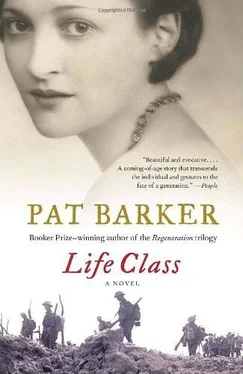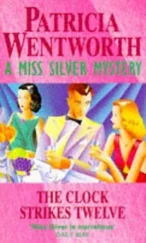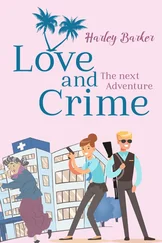‘I know, but it’s got a garden. And it’s cheap.’
Taking the cup from her, he sat down on one of the sofas, feeling the sharpness of worn springs under the velvet cover. ‘Are you getting a divorce?’
‘I’m not sure I could. It’s a lot harder for a woman. A man only has to prove adultery. A woman has to prove adultery and cruelty.’
‘Do you think he’d divorce you?’
‘Never in a million years.’ She forced a smile. Anyway that’s enough about me. I seem to have been talking about meself all evening. What about you?’
‘Oh, what about me? I think we come from the same part of the world. Middlesbrough.’
She shook her head. ‘Grangetown.’
‘It’s only a few miles. Just think, we might have walked past each other in the street.’
‘So how did you get to the Slade? Scholarship?’
‘No, my grandmother died and left me a small legacy. I was working as an orderly in the hospital at the time, but I decided to use the money doing this.’
‘Is that what she’d have wanted?’
‘Good God, no. She wanted me to be a teacher, I think, or a solicitor’s clerk, something like that. Good, steady money and a pension at the end of it.’
‘But you didn’t fancy that?’
‘I thought I had talent.’
‘Thought?’
‘There’s not been much sign of it recently.’
‘Do you think you might be trying too hard?’
‘I’ve got to try. I’m not like Neville. If I make a mess of this there’s no feather-bed for me to fall back on.’
They talked for a while longer, but she was obviously tired and after a few minutes he drained his cup and stood up.
As she was opening the door he said, ‘Would you like to go to a music hall?’ When she hesitated he said quickly, ‘But I don’t suppose you feel much like going out at the moment?’
‘No, I think it would do me a power of good.’
‘Friday at seven? I’ll pick you up.’
As the door closed behind him, he was amazed by the boneaching pain of the separation. He’d known her only a few hours, it oughtn’t to be possible to feel like this. He lingered, hoping she’d part the curtains and look out, but they remained closed, with only a strip of light to show she was still inside. How totally his life had changed in the space of a few hours. Fizzing with excitement, he set off to walk home. As he turned the corner of the street, a man walking fast, head down, hands thrust into his pockets, slammed into him. No apology. No acknowledgement even. Paul turned to stare after him as he strode away, the street lamps passing his shadow like a baton along the pavement. He half expected him to disappear down Teresa’s basement stairs, but no, he went straight past, his hunched figure dwindling rapidly into the dark. Relieved, Paul turned and walked on.
The following day, Paul went to see Professor Tonks to apologize for walking out of the life class. The incident loomed so large in his mind it was salutary to discover how little importance Tonks attached to it. As for leaving the Slade …
‘What’s the point of going now? You may as well wait till the end of term at least.’
‘But if I’m wasting my time?’
‘Are you?’
‘You seemed to be implying that.’
‘I told you your drawing was bad. I don’t remember saying you were wasting your time.’
‘I don’t seem to be getting any better.’
‘Technically you are. Only …’
‘Only?’
‘Most people who come here are bursting with something they want to say, and the trouble I have with some of them is that they can’t be bothered to learn the language to say it in. Whereas with you it’s almost the opposite.’
Paul would have liked to defend himself, but didn’t know how. This wasn’t the criticism he’d been expecting.
‘I do have a problem with life drawing, I know that. But I thought my landscapes were … Well. A bit better.’
‘There’s no feeling.’
‘Perhaps I’m not managing to express it, but —’
‘I don’t get any feeling that they’re yours. You seem to have nothing to say.’
‘I see. No, yes, I do see.’
‘Well, then.’ Tonks spread both hands on his desk, preparatory to rising. ‘I wish I could tell you what to do about it, but I’m afraid you’re going to have to thrash this one out on your own.’
‘I don’t know what to do.’
‘Why don’t you start by asking yourself: Do I want to paint? Or do I want “to be an artist”? Because they’re two very different things. And try to be honest with yourself. It’s not an easy question.’
Tonks had been kind, if not tactful, and Paul backed out of his room feeling that one day, when the sting had worn off, he’d be grateful. At the moment he felt he hadn’t been given much to go on. If Tonks had told him to go and learn anatomy, he’d have done it, no question. Ground and sweated away till he could name every bone and nerve and muscle in the body. He’d never been afraid of work. But ‘nothing to say’? What was he supposed to do about that? And as for wanting ‘to be an artist’ … Well, of course he wanted to be an artist. It was the opposite of the life he’d lived in the shadow of the ironworks that gobbled men up at the start of a shift and regurgitated them twelve hours later fit for nothing but booze and sleep. Too bloody right he wanted to be an artist. And that meant? God knows. He knew what it used to mean. Getting on a bike on Sunday morning and peddling like hell as far away from Middlesbrough as his legs would carry him to set up his easel in a field somewhere to paint trees and hawthorn blossom. Behind him, columns of black smoke, steam, spurts of flame, flakes of soot on sheets hung out to dry, the acrid smell of coke, sparks struck from boots as workers coming off the afternoon shift slurred over the cobbles.
Perhaps that was the trouble. Art had always been Somewhere Else. There flashed into his mind a memory of the back room in the Vane Arms, blue smoke, the rumble of dominoes being shuffled, knobbly hands, liver-spotted, necks like tortoises, blank, incommunicative faces, terse greetings: ‘Now then’, ‘All right?’ and the cold northern light coming in through frosted-glass windows. If he closed his eyes he could hear the scraping of dominoes on the tables. Which was also, come to think of it, the sound of the Café Royal. He’d never painted those men or even thought of doing so till now.
Leave it. Too complicated to sort out now and, besides, he had other things on his mind. Teresa. He thought about her all the time. She came between him and the page.
As soon as the morning session was over, he ran downstairs to the women’s Life Room. Most of the students had gone, but Elinor was still there, putting the finishing touches to her drawing. Seeing her like this through the open door, he was attracted to her all over again, as he had been the first time he saw her in the Antiques Room. He’d come very close to falling in love with her that day. Everything about her had attracted him, from the crown of her shockingly cropped head to the slightly pigeon toes peeping out beneath the hem of her paint-daubed overall. What can you do to resist a girl whose defects are perfections? She was so much more alive than anybody else.
Today she’d been working in charcoal and had black smudges round her mouth where she’d absent-mindedly sucked the stick. Ruthie Wilson, a small dun-coloured girl, like a wren, quick and secretive in every movement, was tapping the corner of her own mouth to point them out. At last, losing patience, she got out her handkerchief, gave it a lick and rubbed the marks away. Elinor stood motionless, like a small child, letting herself be cleaned up. There was so much intimacy in that action, Paul caught his breath.
Читать дальше












